Saint Augustine was one of the greatest of the Latin church fathers and a significant influence in the formation of Western Christianity, including Lutheranism. He was born to Monica and Patricius, a Christian mother and a pagan father, in AD 354 in North Africa.
Augustine's early life was distinguished by exceptional advancement as a teacher of rhetoric. He described his life before his conversion to Christianity in his book Confessions. He was drawn into the moral laxity of the day, plagued by lust, and fathered an illegitimate son. He also joined himself to the Manichaeian religion.
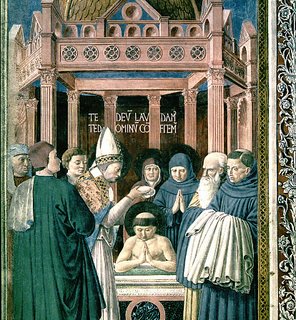 Although he wandered (and sometimes wallowed) through a sinful, unchristian life for many years, Monica continued faithfully praying for Augustine's conversion. Monica's prayers were answered as her son responded to God's Word and the work of the Holy Spirit through the the preaching of Ambrose, Bishop of Milan. Certainly Monica must have rejoiced to see her son baptized by Ambrose on Easter of 387.
Although he wandered (and sometimes wallowed) through a sinful, unchristian life for many years, Monica continued faithfully praying for Augustine's conversion. Monica's prayers were answered as her son responded to God's Word and the work of the Holy Spirit through the the preaching of Ambrose, Bishop of Milan. Certainly Monica must have rejoiced to see her son baptized by Ambrose on Easter of 387.During the Pelagian Controversies of the Fifth Century, Augustine fought the notion of salvation by works and emphasized the unilateral grace of God in the salvation of mankind. The great theologian served as Bishop of Hippo in North Africa from AD 395 until his death in 430. Augustine was a man of immense intellect and deep love, a fierce defender of the orthodox faith, and a prolific writer. In addition to his Confessions, Augustine's book City of God (De Civitate Dei) had great impact upon the Church throughout the Middle Ages and Renaissance.
The Order of Saint Augustine adhered to his teachings and helped to form the thinking of the young German monk, Martin Luther. Augustine's understanding of divine grace and of original sin were espoused and refined by Luther, becoming part of the theology that forged the Reformation.
The barbarian invasions of the 5th Century form the backdrop for his death. Saint Augustine died during the Vandal siege of Hippo. He urged resistance, at least in part because the Vandals held to the Arian heresy. He is listed with Saint Ambrose among the eight great Doctors of the Church. See the commemoration of Ambrose for the entire list.
The picture above represents Augustine's baptism at the hands of Ambrose. The text behind his head is the opening of the medieval hymn, Te Deum Laudamus. Some legends tell that Augustine and Ambrose jointly improvised it at this moment.
Lection
Psalm 87 or 84:7-12
Hebrews 12:22-24,28-29
John 14:6-15
Collect
Lord God, the Light of minds who know You, the Life of souls who love You, and the Strength of hearts who serve You, help us to follow the example of Your servant Augustine of Hippo, knowing You that we may truly love You, and loving You that we may fully serve You, whom to serve is perfect freedom; through Jesus Christ our Lord, who lives and reigns with You and the Holy Spirit, one God, now and forever.
Hymn: Holy God, We Praise Your Name
Holy God, we praise your name;
Lord of all, we bow before you.
All on earth your scepter claim,
All in heaven above adore you.
Infinite your vast domain,
Everlasting is your reign.
Hark! The glad celestial hymn
Angel choirs above are raising;
Cherubim and seraphim,
In unceasing chorus praising,
Fill the heavens with sweet accord:
"Holy, holy, holy Lord!"
Lo, the apostolic train
Join your sacred name to hallow;
Prophets swell the glad refrain,
And the white robed martyrs follow;
And from morn to set of sun
Through the Church the song goes on.
You are King of Glory, Christ;
Son of God, yet born of Mary.
For us sinners sacrificed,
As to death a Tributary,
First to break the bars of death,
You have opened heaven to faith.
Holy Father, holy Son,
Holy Spirit, three we name you,
Though in essence only one;
Undivided God we claim you
And, adoring, bend the knee
While we own the mystery.
Canticle: The Te Deum
Technorati Tags: Saint Augustine | Augustine of Hippo | Augustine | Saint Monica | Monica | Saint Ambrose | Manichaeism | Pelagianism | original sin | Martin Luther | Te Deum Laudamus | Te Deum | Doctor of the Church
 A native of North Africa, Monica was the devoted mother of one of the great theologians of early Christianity. She was born to a Christian family in Tagaste but her parents married her to a pagan named Patricius. Throughout her life she sought the spiritual welfare of her children, especially that of her brilliant son, Augustine, who provides us with the details of his mother's life.
A native of North Africa, Monica was the devoted mother of one of the great theologians of early Christianity. She was born to a Christian family in Tagaste but her parents married her to a pagan named Patricius. Throughout her life she sought the spiritual welfare of her children, especially that of her brilliant son, Augustine, who provides us with the details of his mother's life.Patricius was prone to both adultery and violent rages. Augustine reports that his father beat Monica. She also faced ongoing interference and resentment from her mother-in-law. After she was widowed at a fairly young age, Monica devoted herself to her family. She prayed especially for many years for Augustine's conversion from Manichaeism, a dualistic religious philosophy, and for his release from an immoral lifestyle.
When Augustine left North Africa to go to Italy, she followed him to Rome and then Milan. There she had the joy of witnessing her son's conversion to the Christian faith and his baptism by the Bishop of Milan, Saint Ambrose.
Following her son's conversion and baptism, Saint Monica hoped to travel back to Africa. However, her travels weakened her and she died at Ostia, Italy. On some ecclesial calendars, Monica is remembered on May 4 but many have moved her commemoration to the day before the Church celebrates the life and work of her famous son.
Because the region was visited by missionaries on her feast day, the city of Santa Monica, California was named in her honor.
Technorati Tags: Saint Monica | Monica | Saint Augustine | Augustine of Hippo | Saint Ambrose | Santa Monica
Lutheran Carnival XXXI came out earlier today at What Did Jesus Do. Stop by to check out a fine sample of confessional Lutheran blogging.
Technorati Tags: Lutheran Carnival | blog carnival | confessional Lutheran | Lutheran
Over at Des Moines 360, the Des Moines Girl speculates that yours truly and ALF were Separated at Birth.
DMG and I share other interests, including the use of the Muppet Terror Alert Level indicator in our sidebars. She's also recently posted a multi-part, lighthearted look a the Iowa State Fair.
Technorati Tags: Aardvark Alley | Aardie | ALF | Des Moines 360 | Des Moines Girl | Lutheran | terror alert level
First of all, thanks to Pastor Tom Chryst of Preachrblog for referring to my recent explanation of the BBOV and promoting it at the Lutheran Blog Directory.
In an email, Pastor Chryst reminded me that those who know enough to edit their own blogrolls probably know enough to view the source code for a blog. (For those who don't know, check your browser's View menu item or right click on the page from which you wish to take the information.) Once you do so, you can find and copy the relevant code and see how it sits within the rest of the HTML. Of course, we should not use such methods in order to grab copyrighted material for our own use.
And since I've received a couple new requests for the Big Blogroll O' Vark®™©, let's first drop one and then add a few new blogs. After I'm done, I'll send the updated list to those who've requested it.
Without a Trace
The Lutheran Loser is now a complete loss — IOW, he's 404.
The New ... the Proud ... the Enrolled
This edition's additions include one brand new blogger and two who've been blogging for a few months but whose sites were new to me.
The Proper Distinction (of Law and Gospel) forms the basis for Eli Davis's new blog. By the time you read this, he should be getting his feet on the ground and his fanny in the chairs at Concordia Theological Seminary in Fort Wayne, Indiana.
This Side of the Pulpit is the work of Pastor Christopher Hall of Redeemer Lutheran Church, Enid, Oklahoma.
Brand new daddy Eric Matthaei is On the Wittenberg Trail from his home somewhere in the DFW Metroplex.
Thus far, the Aardvark Updates. If you'd like just the confessional Lutheran bloggers or all the links in my sidebar, please click for the Big Blogroll O' Vark®™© and tell me which list you'd prefer. Or do as Pastor Chryst suggests and grab it all for yourself.
Technorati Tags: Aardvark Alley | Big Blogroll O' Vark | blogroll | blog roll | Lutheran | confessional Lutheran
If you're of a mind, please check out my question about a Platonic beer quote at Purpose Driven Drinking.
Can one truly have a mere platonic love for beer?
Technorati Tags: Plato | philosophy | wise man | brewing | beer
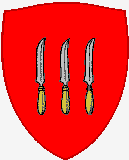 The name "Bartholomew" appears in the New Testament only on lists of the names of the twelve apostles. John gives no list of the Twelve, but refers to more of them individually than do any of the Synoptic writers. He doesn't name Bartholomew, but early in his account (John 1:43-50) he tells of the call to discipleship of one Nathaniel who is supposed to be the same person.
The name "Bartholomew" appears in the New Testament only on lists of the names of the twelve apostles. John gives no list of the Twelve, but refers to more of them individually than do any of the Synoptic writers. He doesn't name Bartholomew, but early in his account (John 1:43-50) he tells of the call to discipleship of one Nathaniel who is supposed to be the same person.The reasoning is as follows: John's Nathanael is introduced as one of the earliest followers of Jesus, in terms suggesting that he became one of the Twelve. He is clearly not Peter, Andrew, James, John, Philip, Thomas, Judas Iscariot, or Judas (not Iscariot), all of whom John names separately.
He isn't Matthew, whose call is described differently. This leaves Bartholomew, James the son of Alpheus, and Simon the Zealot. Of these, Bartholomew is the leading candidate for two reasons: (1) "Bar-tholomew" is a patronymic (a father-based name), meaning "son of Tolmai (or Talmai)." Thus, it's quite likely that he had another name. (2) Nathanael is introduced in John's narrative as a friend of Philip. Since Bartholomew is paired with Philip on three of our four lists of Apostles, it seems likely that they were associated.
We have no certain information about his later life. Some writers, including the historian Eusebius of Caesarea, say that he preached in India. The majority tradition, with varying details, is that Saint Bartholomew preached in Armenia, and was finally skinned alive and beheaded in Albanus or Albanopolis on the Caspian Sea. His emblem in art is, therefore, a flaying knife or knives. Michelangelo certainly followed this line of thinking, imposing his own face on Bartholomew in his "Last Judgment" fresco.
Lection
Psalm 16 or Psalm 103:19-22
1 Kings 19:9-18
Romans 8:28-39 or Acts 11:27-12:3a
Matthew 20:20-28 or Mark 10:35-45
Collect
Almighty God, whose Son Jesus Christ chose Saint Bartholomew to be an apostle to preach the blessed Gospel, grant to Your Church also in our time faithful pastors and teacher to proclaim the glory of Your Name; through Jesus Christ, our Lord, who lives and reigns with You and the Holy Spirit, one God, now and forever.
Technorati Tags: Saint Bartholomew | Saint Nathaniel | Bartholomew | Nathaniel | apostle | martyr | martyrdom
 The BBOV grew out of a set of posts I wrote on Building a Lutheran Presence (click for Part 1 and Part 2). The first deals with the basics of blog building and writing, the second with ways of being noticed and gaining recognition both by people and by search engines and directories. Using a confessional Lutheran blogroll allows each blogger to advertise others' writings both to individuals and to the various search engines.
The BBOV grew out of a set of posts I wrote on Building a Lutheran Presence (click for Part 1 and Part 2). The first deals with the basics of blog building and writing, the second with ways of being noticed and gaining recognition both by people and by search engines and directories. Using a confessional Lutheran blogroll allows each blogger to advertise others' writings both to individuals and to the various search engines.To explain in simplified form, the larger the number of links pointing to a blog, the higher it ranks. There are other factors also involved, but in general, if one blog mentioning "Martin Luther" is linked by 3 other blogs and another by 103, the one with the higher number will also rank higher. Of course, the math the search companies use includes instances of the keywords throughout all the blog's pages, the existing ranking of linked blogs, and other factors, such as being mentioned and linked in individual posts vs. in blogrolls.
Using the BBOV lets each participating blogger promote the greater cause of getting Scripturally sound, confessionally oriented information before as many people as possible. Also, as I add new blogs to the list, I also mention them in an introductory post (see In, Out, and on the Fence as an example), increasing even more the opportunities for individuals to find the blogs and search engines to rank them highly.
If you desire to use either the confessional Lutheran portion or all the blogs in my sidebar feel free to copy them individually or (much more easy!) just click here to request the Big Blogroll O' Vark®™©. Tell me if you want only the confessional Lutherans or if you'd also like the others I list. If you wish to suggest your own (or another) blog for possible inclusion, please use the comments for this or any of the other BBOV posts.
Addendum: If you'd like to advertise your affiliation with the Big Blogroll O' Vark®™©, please consider using one of the following graphics. See BBOV Buttons for the details.
Technorati Tags: Aardvark Alley | Big Blogroll O' Vark | blogroll | blog roll | Lutheran | confessional Lutheran
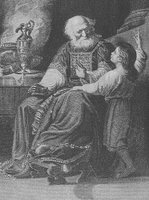 Samuel was the final Old Testament judge. He is the first prophet mentioned after Moses, although one might consider some of the other judges among the prophets. He lived during the 11th century B.C. Samuel's mother Hannah was unable to have children and she prayed desperately before the tabernacle that the Lord would grant her to bear children to her husband Elkanah, an Ephraimite. Because the Lord heard and answered, Hannah called her son "Samuel," which can be translated "heard by God." This account is in the first chapter of 1 Samuel.
Samuel was the final Old Testament judge. He is the first prophet mentioned after Moses, although one might consider some of the other judges among the prophets. He lived during the 11th century B.C. Samuel's mother Hannah was unable to have children and she prayed desperately before the tabernacle that the Lord would grant her to bear children to her husband Elkanah, an Ephraimite. Because the Lord heard and answered, Hannah called her son "Samuel," which can be translated "heard by God." This account is in the first chapter of 1 Samuel.In response to His love for them, Samuel's parents dedicated him to the Lord's service: "And when she had weaned him, she took him up with her, along with a three-year-old bull, an ephah of flour, and a skin of wine, and she brought him to the house of the Lord at Shiloh. And the child was young. Then they slaughtered the bull, and they brought the child to Eli [the priest in the Lord's house]. And she said, 'Oh, my lord! As you live, my lord, I am the woman who was standing here in your presence, praying to the Lord. For this child I prayed, and the Lord has granted me my petition that I made to him. Therefore I have lent him to the Lord. As long as he lives, he is lent to the Lord.' (1:24-28)" He entered sacred service and trained in the house of the Lord at Shiloh under Eli.
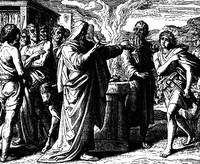 God called Samuel to speak for Him in a series of night messages and established him as His prophet. One of Samuel's most difficult assignments came immediately after his call. Eli was allowing his sons to abuse their priestly offices and through the young man, the Lord condemned their behavior and pronounced God's judgment upon them (see chapter 3).
God called Samuel to speak for Him in a series of night messages and established him as His prophet. One of Samuel's most difficult assignments came immediately after his call. Eli was allowing his sons to abuse their priestly offices and through the young man, the Lord condemned their behavior and pronounced God's judgment upon them (see chapter 3).Samuel's own life didn't always go smoothly. Just as Eli's sons had betrayed their sacred trust as priests, so also Joel and Abijah, the sons of Samuel, became unrighteous judges who "took bribes and perverted justice. (8:1-2)" Perceiving this as a problem in God's leadership as well as that of Samuel, Israel demanded that they be given a king such as the surrounding nations had. Samuel warned them that this would lead to even more problems and woes, but when they kept insisting, the Lord told him to do as the people requested.
Samuel anointed Saul to be Israel's first king (10:1). Because of Saul's continuing, flagrant disregard for God's Word, Samuel repudiated Saul's leadership and traveled to the house of Jesse, where he anointed David to be king in place of Saul (16:13).
Samuel's loyalty to God, his spiritual insight, and his ability to inspire others made him one of Israel's great leaders. When he died, "all Israel assembled and mourned for him, and they buried him in his house at Ramah. (25:1a)"
Technorati Tags: Samuel | judge | prophet | Israel | Hannah | Elkanah | King Saul | King David | Eli
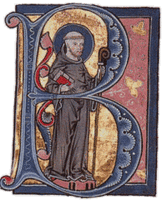 ernard of Clairvaux, a leader in Christian Europe in the first half of the 11th century A.D., is honored in his native France and around the world. Born into a noble Burgundian (Fontaines, near Dijon) family in 1090, he was drawn toward the Church by his own nature and encouraged by his mother's desire. His family opposed His desire to enter a monastery and sent him to study at Châlons in order to qualify him for higher ecclesiastical office. However, Bernard left his affluent heritage, entering the monastery of Citeaux at age 22. He persuaded four of his brothers, an uncle, and 26 other men, mainly the sons of nobles, to join him.
ernard of Clairvaux, a leader in Christian Europe in the first half of the 11th century A.D., is honored in his native France and around the world. Born into a noble Burgundian (Fontaines, near Dijon) family in 1090, he was drawn toward the Church by his own nature and encouraged by his mother's desire. His family opposed His desire to enter a monastery and sent him to study at Châlons in order to qualify him for higher ecclesiastical office. However, Bernard left his affluent heritage, entering the monastery of Citeaux at age 22. He persuaded four of his brothers, an uncle, and 26 other men, mainly the sons of nobles, to join him.After two years he and several others were sent to a new monastic house at Clairvaux, where Bernard soon became its abbot. His work there was blessed in many ways. The monastery at Clairvaux grew in mission and service, eventually establishing some 68 daughter houses.
During the disputed papal elections between Anacletus II and Innocent II, he took the side of Innocent. From 1130-38, Bernard worked to solidify the papal claim through ecclesiastical and secular politics. He battled against the "New Teaching" espoused by Pierre Abélard at the University of Paris, resisting a broad-based liberal arts education using the philosophy of Aristotle. Instead, Bernard insisted that such an education was only to be used in preparation for the priesthood.
At the command of Pope Eugenius III in 1146, Bernard preached in favor of a new effort to free the Holy Land from the Mohammedans. This gave life to the previously moribund Second Crusade. While the results of the campaign were certainly mixed, events during it served to enhance Bernard's perception among non-Christians: When a monk named Radulf (or Raoul) incited the populace of Mainz against the Jews, Bernard vigorously opposed him, calling the monk arrogant, without authority, a preacher of mad and heretical doctrines, a liar, and a murderer. Radulf slipped away, the riots ended, and Bernard became known as a "righteous gentile." His reputation among Rhine valley Jews remained so good that his name is still given to some of their descendents. The most famous of these would probably be American businessman and presidential advisor Bernard Baruch.
Certainly, we remember St. Bernard for his charity and political abilities. Even more, we honor his preaching ability and, especially, his poetry and hymn writing (cf. CyberHymnal and Hymnuts): The texts of O Jesus, King Most Wonderful (MIDI audio) and O Sacred Head, Now Wounded (MIDI audio), as well as others, remain vital parts of our Christian heritage.
Martin Luther cited Saint Bernard in a number of his writings. When Bernard spoke of justification by grace through faith, Luther commended the teaching. For example, in his commentary on Psalm 110, the reformer wrote, "This is the kind of joy and comfort St. Bernard had in his heart, so that he could say, on the basis of this article: 'How can I ever become sad and mournful or discouraged? After all, my flesh and blood sits in heaven above. I expect He will not be my enemy.' For St. Bernard to apply this to himself and to boast this way is certainly a genuinely spiritual, heavenly, and divine thought, derived from his faith. For he had also amounted to something in the world. He had been rich enough, noble, learned, and holy. But before God St. Bernard knows no other boast or comfort than this Lord. (LW 13:245)"
Where Bernard lapsed into exalting the office of the papacy or waxed eloquent on the merits of the saints — particularly Mary — Luther condemned these works as false and misleading. Yet the reformer appreciated and held close the monk's death-bed confession of personal unworthiness and total reliance on Christ's merits: "That is how St. Bernard was saved. He was an exemplary monk; he observed the rules of his order scrupulously, and he fasted so assiduously that his breath stank and no one could abide his presence. But on the threshold of death he exclaimed: 'Oh, I have lived damnably! But heavenly Father, Thou hast given me Thy Son, who has a twofold claim to heaven: first, from eternity, by reason of the fact that He is Thy Son; secondly, He earned heaven as the Son of man with His suffering, death, and resurrection. And thus He has also given and bestowed heaven on me. [Sermones in cantica, Sermon XX, Patrologia, Series Latina, CLXXXIII, 867]' Thereby St. Bernard dropped out of the monastic role, forsook cowl and tonsure and rules, and turned to Christ; for he knew that Christ conquered death, not for Himself but for us men that all who believe in the Son should not perish but have eternal life. And so St. Bernard was saved. (LW 22:360)"
In case you're wondering, the Saint Bernard dog is not named for Bernard of Clairvaux but indirectly for Bernard of Montjoux (or Menthon), an earlier monk who founded a travelers' hospice and monastery in the Pennine Alps and another hospice in the Graian Alps. Both of these passes were later named for him and and the large rescue dogs for these places where they were stationed.
Suggested Lection
Psalm 139:1-12 or 19:7-11
Sirach 39:1-10
John 15:7-11
Collect
O God, by whose grace Your servant Bernard of Clairvaux, kindled with the flame of Your love, became a burning and a shining light in your Church, grant that we also may be aflame with the spirit of love and discipline, walking before Tou as children of light; through Jesus Christ our Lord, who lives and reigns with You and the Holy Spirit, one God, now and for ever.
Be Thou my Consolation, My Shield when I must die;
Remind me of Thy Passion When my last hour draws nigh.
Mine eyes shall then behold Thee, Upon Thy cross shall dwell,
My heart by faith enfold Thee. Who dieth thus dies well!(P. Gerhardt; from Bernard's Salve caput cruentatum)
Hymn texts and MIDI audio linked from the Lutheran Hymnal Project.
Martin Luther quotes from Volume 13: Luther's Works, Selected Psalms II, © 1956 by Concordia Publishing House and Volume 22: Luther's Works, Sermons on the Gospel of St. John: Chapters 1-4, © 1957 by Concordia Publishing House.
Technorati Tags: Bernard of Clairvaux | Saint Bernard | St Bernard | Martin Luther | justification by grace through faith | hymns | Lutheran | theology | Lutheran Hymnal Project
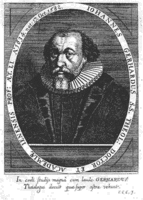 Born 17 October 1582, Johann Gerhard, a Lutheran theologian in the tradition of Luther (1483–1546) and Martin Chemnitz (1522–86), was the most influential 17th Century dogmaticians. Many still consider his Loci Theologici in 23 large volumes to be one of the most definitive statements of Lutheran orthodoxy. Born in Quedlinburg, Germany, Gerhard was stricken with a life-threatening illness at age 15.
Born 17 October 1582, Johann Gerhard, a Lutheran theologian in the tradition of Luther (1483–1546) and Martin Chemnitz (1522–86), was the most influential 17th Century dogmaticians. Many still consider his Loci Theologici in 23 large volumes to be one of the most definitive statements of Lutheran orthodoxy. Born in Quedlinburg, Germany, Gerhard was stricken with a life-threatening illness at age 15.Following this experience, coupled with with guidance from his pastor, Johann Arndt, Gerhard experienced a turning point: He devoted the rest of his life to theology, serving many years as the Superintendent of Heldberg and, later, of the Duchy of Coburg. Eventually he become a professor at the University of Jena. With a sharp, critically trained mind, Gerhard also possessed deep evangelical piety and love for Jesus.
He wrote exegetical and theological works, devotional literature, history, and polemics. Many of his sermons remain in publication, still exercising wide influence upon confessional Lutheran thought. Since its writing and subsequent translation, his Sacred Meditations (see this online translation by Wade R. Johnston in PDF) probably outsold almost every book in the Western world except the Bible and The Imitation of Christ by Thomas a Kempis.
For more detailed information, see the Studium Excitare, Wikipedia, and the Christian Cyclopedia.
Partial List of Works
† Exegesis: Commentarius in harmoniam historiae evangelicae de passione Christi (A comentary harmonizing the Gospel accounts of Christ's Passion, 1617)
† Exegesis: Comment, super priorem D. Petri epistotam (1641)
† Exegesis: Commentaries on Genesis (1637) and Deuteronomy (1658)
† Theology: Confessio Catholice (Universal Confession, 1633-1637), a defense of the evangelical and catholic nature of the Augsburg Confession
† Theology: Loci communes theologici (1610-1622)
† Devotional: Meditationes sacrae (Sacred Meditations, 1606)
Suggested Lection
Psalm 46
Isaiah 55:6-11
Romans 10:5-17
John 15:1-11
Collect
O Lord God, heavenly Father, pour out Your Holy Spirit upon Your faithful people, keep them steadfast in Your grace and truth, protect and comfort them in all temptation, defend them against all enemies of Your Word, and bestow on Christ's Church Militant Your saving peace; through Jesus Christ, Your Son, our Lord, who lives and reigns with You and the Holy Spirit, one God, now and forever. Amen.
Lord, keep us steadfast in Your Word.
Technorati Tags: Johann Gerhard | Martin Luther | Martin Chemnitz | Johann Arndt | Lutheran | orthodoxy | theology | Loci Theologici | Sacred Meditations | Meditationes sacrae
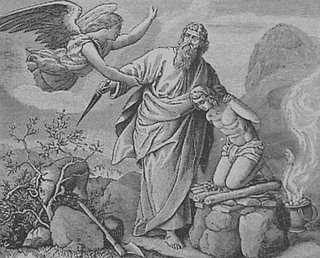 If any part of Scripture besides the Resurrection clearly indicates that God gets the last laugh, it's got to be the story of Isaac.
If any part of Scripture besides the Resurrection clearly indicates that God gets the last laugh, it's got to be the story of Isaac.After giving new names to Abraham and Sarah, the Lord promised a them a son. At the time, Abraham was 99 and Sarah was 90 (see Genesis 17). When Abraham heard the news, he "fell on his face and laughed and said to himself, 'Shall a child be born to a man who is a hundred years old? Shall Sarah, who is ninety years old, bear a child?' (v. 17)"
In response to the laughter and doubting, the Lord said, "Sarah your wife shall bear you a son, and you shall call his name Isaac. I will establish my covenant with him as an everlasting covenant for his offspring after him. (v. 19)" Isaac means "He Laughs."
To reiterate His point, the Lord allowed Sarah to overhear Him repeat His promise to Abraham at the Oaks of Mamre (see Genesis 18). "So Sarah laughed to herself, saying, 'After I am worn out, and my lord is old, shall I have pleasure?” The Lord said to Abraham, 'Why did Sarah laugh and say, "Shall I indeed bear a child, now that I am old?" Is anything too hard for the Lord? At the appointed time I will return to you about this time next year, and Sarah shall have a son.' But Sarah denied it, saying, 'I did not laugh,' for she was afraid. He said, 'No, but you did laugh.' (vv. 12-15)"
Sure enough, things happened not as Abraham and Sarah may have expected, but as the Lord had planned and promised. When Abraham was 100 years old, Sarah gave birth and "Abraham called the name of his son who was born to him, whom Sarah bore him, Isaac. (21:3)" Sarah likewise revelled in the irony: "God has made laughter for me; everyone who hears will laugh over me. (v. 6)"
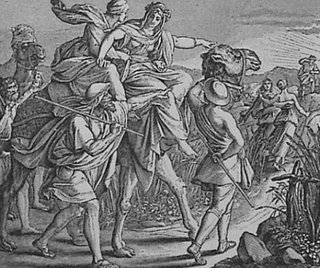 When he was a young man, Abraham took Isaac to Mount Moriah. There, Abraham, obeying God's command, prepared to sacrifice his son as a burnt offering. But God intervened, sparing Isaac's life and providing a ram as a substitute offering (22:1-14).
When he was a young man, Abraham took Isaac to Mount Moriah. There, Abraham, obeying God's command, prepared to sacrifice his son as a burnt offering. But God intervened, sparing Isaac's life and providing a ram as a substitute offering (22:1-14).In so doing, God also pointed to the substitutionary sacrifice of His own Son Jesus Christ for the sins of the world. When the author of Hebrews expounded on the faith of Abraham (11:8-19), he made special note of Abraham's belief that, in order to accomplish His purposes, "God was able even to raise [Isaac] from the dead, from which, figuratively speaking, he did receive him back. (v. 19)"
Abraham sent a faithful servant back among their kinfolk in order to find a bride for Isaac. There, the servant found Rebekah, who gladly traveled with this stranger to a new land, where she was given in marriage to Isaac (Genesis 24). They had twin sons, Esau and Jacob (25:19-26).
In his old age, Isaac became weak and blind. Before he died, he desired to give his blessing and the chief inheritance to Esau, his elder and favorite son, even though the Lord had promised Rebekah that their birth order would be reversed in the blessing and Jacob would be the favored son (25:23). However, Rebekah showed her favorite, Jacob, how to deceive his father and gain the blessing for himself (27:1-40). Of course, this resulted in years of bitter family strife, although Jacob and Esau later reconciled (Genesis 33).
Isaac lived to the age of 180 and was buried by his sons in the family burial cave of Machpelah (35:28-29).
Technorati Tags: Isaac | Abraham | Sarah | laugh | laughter | Jacob | Esau | Jacob and Esau | Messianic prophecy | sacrifice | the Lord will provide
 The honor paid to Saint Mary, the virgin mother of Jesus Christ our Lord, God, and Savior goes back to the earliest days of the Church. Indeed, it goes back farther: Even before the birth of her Son, Mary prophesied, "From now on all generations will call me blessed. (Luke 1:48 ESV)" Confessing her as "Mother of God" also confesses that the One whom she bore was and is, indeed, true God.
The honor paid to Saint Mary, the virgin mother of Jesus Christ our Lord, God, and Savior goes back to the earliest days of the Church. Indeed, it goes back farther: Even before the birth of her Son, Mary prophesied, "From now on all generations will call me blessed. (Luke 1:48 ESV)" Confessing her as "Mother of God" also confesses that the One whom she bore was and is, indeed, true God.The New Testament records several incidents from the life of the Virgin: her betrothal to Joseph, the Annunciation by the angel Gabriel that she was to bear the Messiah, her Visitation to Elizabeth the mother of John the Baptist, the Nativity of our Lord, the visits of the shepherds and the magi, the Presentation of the infant Jesus in the Temple at the age of forty days, the flight into Egypt, the Passover visit to the Temple when Jesus was twelve, (Matthew 1:16,18-25; Matthew 2; Luke 1:26-56; Luke 2); the wedding at Cana in Galilee and the performance of her Son's first miracle (at Mary's intercession, see John 2:1-11), the occasions when observers basically said of Jesus, "How can this man be special? We know his family!" (Matthew 13:54-56; Mark 6:1-3; Luke 4:22; see also John 6:42); an instance when she came with others to see Him while he was preaching (Matthew 12:46-50; Mark 3:31-35; Luke 8:19-21); and her presence at His crucifixion, where Jesus commended her to the care of His Beloved Disciple (John 19:25-27). Mary was also present with the apostles in Jerusalem following the Ascension, waiting for the promised Spirit (Acts 1:14). Thus, we see her present at many of the chief events of her Son's life.
Besides Jesus, only two people are mentioned by name in the Creeds. One is Pontius Pilate, Roman procurator of Judea from 26 to 36 AD. Knowing that Jesus was crucified by Pilate's order pins down the date of His death within a few years, certifying that we are not talking "once upon a time," like worshipers of some mythical god. His death is an historical event, something that really happened.
The other name in the Creeds is that of Mary. They say that Christ was "born of the virgin Mary." That is, they assert that he was truly and fully human, born of a woman and not descended from the skies like an angel. Jesus was not a spirit temporarily cloaked in a robe of human-seeming flesh.
Telling us that His mother was a virgin excludes the theory that Jesus was an ordinary man who was so virtuous that he eventually, at His baptism, became filled with a "Christ Spirit" by God. His virgin birth attests that He was always more than merely human, always one whose presence among us was in itself a miracle, from the first moment of His earthly existence. In Mary, Virgin and Mother, God gives us a sign that Jesus is both truly God and truly man. Emphasizing this point, the Council of Ephesis in AD 431 officially titled her Theotokos (God-bearer) and rejected and condemned the title Christotokos (Christ-bearer). Pastor Snyder of Ask the Pastor commented on the distinction in Blessed Virgin Mary: Mother of God.
We know Little of Mary's life except as it intersects with the life of her Son; this is appropriate. The Scriptures record her words to the angel Gabriel, to her kinswoman Elizabeth, and to her Son on two occasions. The only recorded saying of hers to "ordinary" hearers is her instruction to the servants at the wedding feast: "Do whatever he [Jesus] tells you. (John 2:5 ESV)" Perhaps this should be the summation of her message to the world. To this day, she reminds us, "Listen to Jesus. Pay attention to my Son. Do as He says."
She didn't seek the regard of others on her own behalf. If our honor for the Blessed Virgin doesn't turn our attention from her to the One whom she bore and suckled, to the Word made flesh, then we may be certain that it is not the blessing that she seeks. A right regard for Mary always directs us to Him who made her womb His first earthly dwelling-place.
In different parts of the Church, the date is remembered in various ways. Roman Catholicism celebrates the Assumption of Mary and claims that she was taken, body and soul, to heaven. However, I've found contradictory teachings in the Roman Church, arguing whether she was translated in the manner of Enoch or Elijah, if she died and was resurrected on earth and then taken to heaven, or if her dead body was taken and then rejoined with her soul in heaven.
Meanwhile, Eastern Orthodoxy celebrates the Dormition of the Theotokos. It claims that Mary certainly died but that when Thomas visited three days later, her body was gone from the tomb. As to whether the body will be kept in heaven until the general resurrection on the Last Day or already rejoined with her spirit, Orthodoxy will not make a final dogmatic pronouncement.
In the rest of Christendom that follows a sanctorial calendar, the general belief seems to be that she likely died and awaits the resurrection with all others who departed in the Faith. See Jesus, Mary, and Martin for more on Lutheran teachings concerning the Virgin, including citations from Martin Luther and the Lutheran Confessions.
Lection
Psalm 34:1-9 or Psalm 45:10-15
Isaiah 61:7-11
Galatians 4:4-7
Luke 1:46-55
Collect of the Day
Grant, we humbly pray, O Lord, to Your servants the gift of Your heavenly blessing that, as the Son of the Virgin Mary has granted us salvation, we may daily grow in Your favor; through Jesus Christ, Your Son, our Lord, who lives and reigns with You and the Holy Spirit, one God, now and forever.
Technorati Tags: Saint Mary | Virgin Mary | Mother of God | Assumption of the Blessed Virgin Mary | BVM | Mary | Theotokos | Christotokos | Dormition of Mary | Dormition of the Theotokos | Martin Luther | Lutheran Confessions
Updating the blogroll — what a good excuse to learn at least a little HTML. But first, I hope that my fellow bloggers will read the following and take it to heart.
Here's a request (with which I heartily concur) from TK (of Be Strong in the Grace, Katie's Beer, et al.): "Thanks, Aardvark, for the blogroll updates! I was wondering if you could give a little peptalk to the ol' blogroll on the importance of having an RSS feed activated. Some of us depend on those feeds to keep ourselves reading good blogs! It is usually a simple matter of checking a box in the blog settings. Thanks!"
I'm not sure how one does this with all the different platforms and programs available. However, for Blogger, the process is as about as simple as TK states. From your dashboard, click the "Settings" button. Then click "Site Feed" and toggle "Publish Site Feed" to "Yes." Save settings, publish your blog, and you're good to go. This will not only help those using RSS readers but also keeps Technorati updated, gets you updated more quickly in the search engines, and generally aids people in finding and reading whate'er you've written.
And now, on to the Big Blogroll O' Vark®™©:
Aadditions
Robert Hunter's blogging alias is The Heresy Hunter. He specializes in finding and publishing much of the false teaching passing itself off as Christianity.
David Whalen writes on being Orthodox Lutheran — never easy and increasingly difficult in these times of colliding theological fundamentalism and relativism.
Schaaf's Kopf features the thoughts of LCMS Pastor K. R. Schaaf, a minister of the Gospel in the Carolinas.
Working Out My Salvation is the blog (and, we must assume, the goal) of Adam Roe, "a full time Air National Guardsman in Illinois."
A Christian scientist (not a Christian Scientist), Christopher Heren also finds time to write Mother Hubbard's Cupboard, a truly eclectic contribution to the Lutheran blogosphere.
Aalterations
Michael Scheurmann has moved: Note the new URL for Poor Michael's Almanac.
Lisa S. (aka "worthywoman") has quit posting at her LiveJournal blog JustWords, although it remains there for archival purposes. Please change your link to Blessed and Content — and Disabled.
Aannihilated
The following sites have been abandoned. Two were picked up by internet vultures while Saint Floyd left one post as a marker. If you know of their new whereabouts, please let me know:
Living Like a Lutheran
The Small Catechlysm
Yada Yada Yada
Aat a Crossroads
These people haven't posted for some time and are in danger of being voted off the island in a future update. If you're a reader who likes what they write, please visit their sites and poke 'em with a sharp stick. If you are one of these people, please come back, I miss you.
Lutheran Hymn Revival
Spirit and Life
Seward Snow Dog
Masks of God
All the Fulness
and (sadly) Bunnie Diehl
That concludes this episode of Updating with the Aardvark. If you'd like a list of the confessional Lutheran bloggers or all the links in my sidebar, please click for the Big Blogroll O' Vark®™© and tell me which list you'd prefer.
Technorati Tags: Aardvark Alley | Big Blogroll O' Vark | blogroll | blog roll | Lutheran | confessional Lutheran
Yep, it's time for the Triple X-Rated edition of the Lutheran Carnival — so ranked not because it appeals to any prurient interest but because there were XXIX that preceded it. Random Dan put LC XXX together and posted it at the main carny blog. Drop by and sample the wares of the participating bloggers.
Technorati Tags: Lutheran Carnival | blog carnival | confessional Lutheran | Lutheran
A little vacation and I forget the routine. Anyhow, you have a few more hours before carnival deadline. See the mother blog for details and submission guidelines.
I've previously noted that I only occasionally respond to a blog tag or meme. The Book Tag making the rounds is an exception. Not only did Rev. McCain tag me, I've also seen it posted at other sites with an open invitation to do likewise.
Like others who've participated, narrowing things down to one choice is daunting. I left myself a little wiggle room by counting series as on big book. However, for each I listed, I could easily replace it with a handful to dozens of alternate choices.
1. One book that changed your life:
Luther, Small Catechism
2. One book, other than the Bible, that you've read more than once:
Tolkien, The Lord of the Rings
3. One book you'd want on a desert island:
The Lord Will Answer: A Daily Prayer Catechsim
4. One book that made you laugh:
P. J. O'Rourke, Give War a Chance: Eyewitness Accounts of Mankind's Struggle against Tyranny, Injustice, and Alcohol-Free Beer
5. One book that made you cry:
Fred Gipson, Old Yeller
6. One book that you wish had been written:
A Founding Fathers' Guide to Interpreting the United States Constitution
7. One book that you wish had never been written:
Hal Lindsey, The Late Great Planet Earth
8. One book you're currently reading:
Madeleine L'Engle, The Young Unicorns
9. One book you've been meaning to read:
Klemet Preus, The Fire and the Staff
10. Tag others:
Samantha Burns, Robert Waters, Tim, Caspar, and Jon Ledetroit of Beggars All, and any other bloggers reading this.
Technorati Tags: books | tag | meme
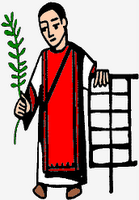 A river, a gulf, and a seaway are named in his honor. A number of Christian congregations and almost anyone known as "Larry" likewise owe their names to this martyr of the ancient Christian Church.
A river, a gulf, and a seaway are named in his honor. A number of Christian congregations and almost anyone known as "Larry" likewise owe their names to this martyr of the ancient Christian Church.Early in the third century A.D., Laurence (also often "Lawrence," "Lorenz," or "Lorenzo"), most likely born in Spain, made his way to Rome. There he was appointed chief of the seven deacons and was given the responsibility to manage church property and finances.
The emperor at the time, thinking that the church had valuable things worth confiscating, ordered Laurence to produce the "treasures of the church." Saint Laurence brought before the emperor the poor whose lives had been touched by Christian charity. He was then jailed and eventually executed in the year 258 by being roasted on a gridiron.
His martyrdom left a deep impression on the young church. Almost immediately, the date of His death, 10 August, became a permanent fixture on the early commemorative calendar of the Church.
Lection
Psalm 65:1-8 or 34:1-10
Deuteronomy 33:1-3 or Isaiah 26:1-4, 8-9, 12-13, 19-21
Revelation 7: 2-17 or 21:9-11, 22-27; 22:1-5
Matthew 5:1-12
Collect
Stir up, O merciful Father, Your people to true brotherly affection that we may gladly do good and serve our neighbor, as did Your servant Saint Laurence when he emptied the treasure of the Church to help the poor; through our Lord Jesus Christ, who lives and reigns with You and the Holy Spirit, one God, now and forever.
Technorati Tags: Saint Laurence | Saint Lawrence | Lorenz | Lorenzo | deacon | martyr | martyrdom
This update of the Big Blogroll O' Vark®™© includes entries from way down south. No, not Houston or Hot-Lanta (although Virginia and Mississippi are represented). I mean south-of-the-equator south. Along with various northern hemispheroids, several bloggers from Down Under are surfacing here at the Alley.
Most of the new additions will be counted among the confessional Lutherans. One, however, finds itself among the "Other Blogs." That doesn't mean it isn't worth a read.
Added to the "Other Blogs" — But Certainly not Second-rate
I'll lead off with The Sectarian Strand, the Mild Colonial Boy's literate and often biting blog. He recently renamed it — it was formerly known as Kicking Against the Pricks. My first read suggested that he was Lutheran; it turns out that the Mild Colonial Boy is still undergoing the rigors of catechesis. Therefore, I shall list him as an "other" but hope that as soon as he joins the The Australian Evangelical Lutheran Church, he will contact me so that I might move him up among his like-minded Lutheran cohorts.
The Confessional Lutheran Additions
J. Hansen of Fredericksburg, Virginia is Cleaving the Darkness with his unique perspective as orthodox Lutheran and aerospace engineer.
Philosopher, mathematician, and former pastor L. P. Cruz of Melbourne, Victoria, Australia writes Extra Nos. Anyone who uses Kurt Gödel's image in his profile automatically catches my attention.
Next is Cruce Tectum, the blog of Pastor Jonathon T. Krenz of Dorr, Michigan. Here you'll find some solid theological essays.
Australian and self-described "catholic thinking Lutheran seminarian" Thomas Pietsch writes Always Yes.
Meanwhile, Jackson, Mississippi shares Lutheran Loser (see Matthew 10:39) Matt Simpson with us.
Homestead Lutheran Academy provides a nice balance of home and hearth with theological acumen. Marie certainly understands her vocation and shares it in fine manner.
Please visit my new friends and tell 'em the Aardvark sent you. Click this link to request your own updated copy of the Big Blogroll O' Vark®™©. If you'd like to share the list with others, please link back to this post and/or set an email link from your own blog.
Technorati Tags: Aardvark Alley | Big Blogroll O' Vark | blogroll | blog roll | Lutheran | confessional Lutheran
This past Thursday's Idle Ramblings of the Luther Punk do a good job of discussing Mel Gibson's recent rants in light of the volatile combination of strong emotion and alcohol. Do yourself a favor and read the comments on That's Enough Tequila, Mr. Gibson, also.
Technorati Tags: Mel Gibson | Luther Punk | antisemitism | alcohol | Lutheran
 I dare not utter the dreaded "Odd Couple" cliche, but Shawn Spencer and Burton "Gus" Guster are the most mismatched partners to grace television in years. And yes, grace is a good word. Cable's original programming is getting stronger all the time and USA Network's Psyche is a pleasant addition to the mix. Indeed, it's becoming one of the few shows I actually plan ahead to watch.
I dare not utter the dreaded "Odd Couple" cliche, but Shawn Spencer and Burton "Gus" Guster are the most mismatched partners to grace television in years. And yes, grace is a good word. Cable's original programming is getting stronger all the time and USA Network's Psyche is a pleasant addition to the mix. Indeed, it's becoming one of the few shows I actually plan ahead to watch.The simple premise (ne'er-do-well cop's kid becomes private detective pretending to be a psychic) belies the solid character acting in an ensemble cast. Each of the characters is just human (and normal) enough to avoid being a complete caricature and all do well at playing off of each other and exploiting the others' assorted weaknesses and vanities. While not cloaked as deeply as those in an Agatha Christie novel, clues are revealed gradually and not always completely obviously, giving watchers the opportunity to solve along with Shawn.
Regarding television and films, I'm never quite sure whether something is a pleasure or a guilty pleasure. Psyche definitely falls into one of those categories.
Technorati Tags: Psyche | television | TV | USA Network
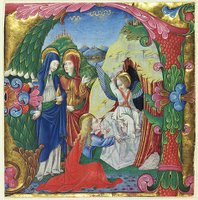 These "faithful women," as they're called among some Christians, were the earliest visitors to the tomb of the crucified Christ early on the first day of the week. Their trek to His sepulcher was recorded in each of the Synoptic Gospels, although each includes different details. (see Matthew 28:1-8, Mark 16:1-8, and Luke 24:1-11).
These "faithful women," as they're called among some Christians, were the earliest visitors to the tomb of the crucified Christ early on the first day of the week. Their trek to His sepulcher was recorded in each of the Synoptic Gospels, although each includes different details. (see Matthew 28:1-8, Mark 16:1-8, and Luke 24:1-11).Joanna was the wife of Cuza, a steward in Herod's household (Luke 8:3). Mary, the mother of James the son of Alphaeus, also faithfully provided care for Jesus and His disciples from the time of His Galilean ministry through His burial after the crucifixion. Salome, the mother of the sons of Zebedee (Matthew 27:56), joined with the women both at the cross and in the bringing of the spices to the garden tomb. These "faithful women" have been honored in the Church throughout the centuries as examples of humble and devoted service to the Lord.
Suggested Lection
Psalm 45:1-9
1 Corinthians 15:1-11
Luke 23:54-24:11 or Mark 16:1-8
Suggested Collect
Blessed Lord, through Your only-begotten Son You overcame death and by Your Holy Spirit You call us to Him that we might believe and be saved. Grant that as the women came to His tomb on Easter morn and found joy where they expected sorrow, so we might also come to Christ Jesus, casting our cares upon Him and receiving forgiveness, peace, and the sure and certain hope of everlasting life through Him who reigns eternally with You and the Holy Spirit, one God, now and forever.
Technorati Tags: Jesus | burial | resurrection | tomb | Easter | women | Joanna | Mary | Salome

